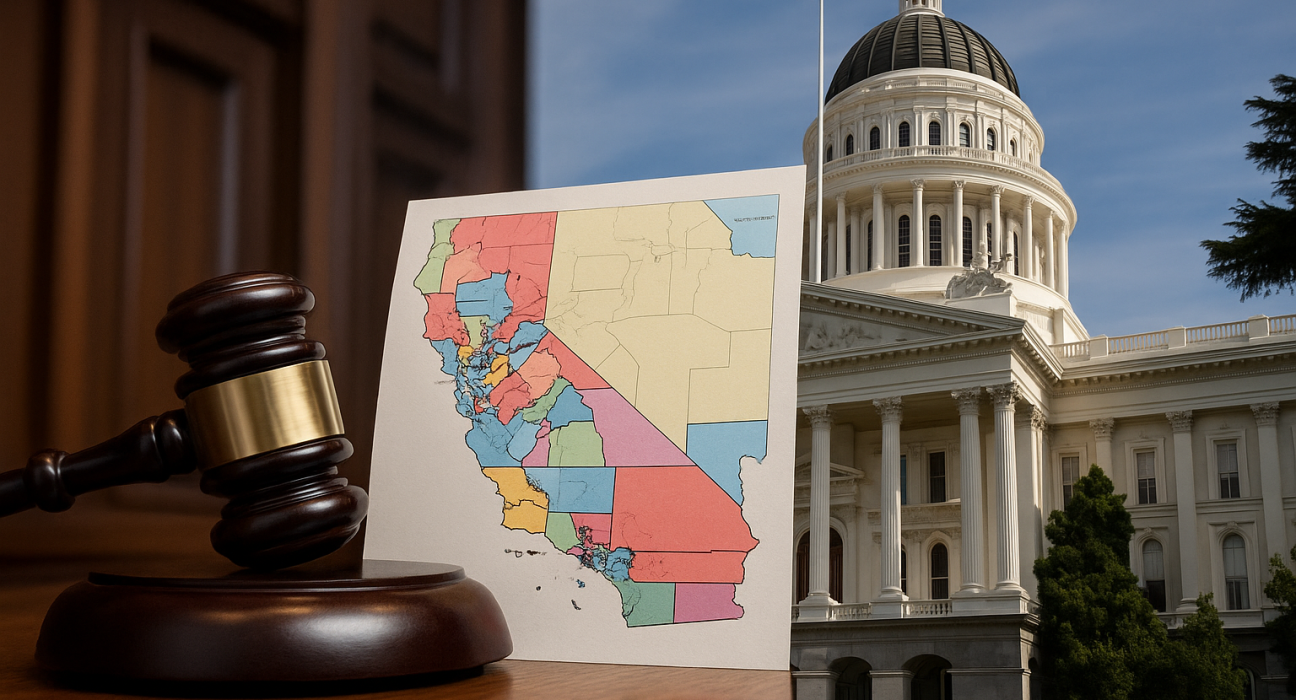The U.S. Department of Justice filed a federal lawsuit Thursday challenging California’s newly approved congressional map, opening a high-stakes legal front that could help decide control of the U.S. House in 2026. The move marks an extraordinary moment in American politics: a Republican administration suing a Democratic-led state over redistricting, in a mirror image of California’s own lawsuit against Texas for similar reasons.
The DOJ’s complaint targets Proposition 50, a ballot measure passed by California voters last week that redraws congressional boundaries mid-decade to favor Democrats. The measure, championed by Governor Gavin Newsom, is designed to flip as many as five Republican-held seats. Newsom argued the changes were needed to “counteract” Republican gerrymandering in Texas and Missouri, which were redrawn earlier this year after encouragement from President Donald Trump.
The Federal Government’s Case
Attorney General Pam Bondi, who was appointed by Trump, called California’s plan “a brazen power grab that tramples on civil rights.” The DOJ’s lawsuit claims the new districts violate the Equal Protection Clause of the U.S. Constitution by using race as a proxy for political advantage, particularly in areas where the new maps created majority-Hispanic districts. The complaint asserts that race was used “without compelling justification” and asks the court to prohibit the state from using the new lines in upcoming elections.
According to the filing, the DOJ argues that Proposition 50 was drawn “with racial intent” to secure partisan outcomes — a legal framing that mirrors conservative challenges to Voting Rights Act provisions allowing race to be a factor in promoting minority representation. Civil rights groups, however, say the claim is ironic given that the Justice Department has not intervened in Texas, Missouri, or North Carolina, where maps also appear to advantage white voters.
California’s Response
Governor Newsom and his allies responded defiantly. “These losers lost at the ballot box and soon they will also lose in court,” said Newsom’s spokesperson Brandon Richards, arguing that the federal lawsuit is a political stunt designed to distract from what Democrats view as the GOP’s own unconstitutional gerrymandering elsewhere. Newsom has positioned himself as a national foil to Trump, and this legal clash amplifies that rivalry.
California Democrats maintain that the new maps were approved by voters, not politicians, giving them democratic legitimacy. Proposition 50 suspended boundaries drawn by an independent redistricting commission in 2021 and replaced them with congressional lines designed to strengthen Democratic representation, particularly in the Central Valley and parts of Orange County.
Broader National Context
The California-DOJ clash represents the next stage of an escalating state-versus-state redistricting war, with both parties now openly redrawing maps to gain congressional seats mid-decade — something once considered politically taboo. Republicans currently hold 219 seats to Democrats’ 214, meaning that flipping just a handful could determine control of the House in 2026.
Democrats hope California’s changes will neutralize GOP gains in Texas, Missouri, and North Carolina, where state Republicans redrew lines to secure additional seats after Trump urged them to do so. Meanwhile, the Justice Department’s decision to target California — but not those Republican states — is already fueling accusations of selective enforcement and political double standards.
Former California Governor Arnold Schwarzenegger, a moderate Republican, opposed Proposition 50, saying it undermines the integrity of the independent commission system he helped create. Conversely, former President Barack Obama endorsed the measure, calling it a “smart way to level the playing field.” The ballot initiative attracted tens of millions of dollars from national donors, including a $5 million contribution from the Congressional Leadership Fund, a Republican super PAC tied to House Speaker Mike Johnson.
The Legal Landscape and Likely Outcomes
Legal scholars say the DOJ’s lawsuit raises several complex constitutional questions. Central among them is whether states can use race-conscious mapping if the intent is to increase minority representation and counteract gerrymanders elsewhere. The Supreme Court’s conservative majority has signaled skepticism toward racial factors in redistricting, as seen in the ongoing case Louisiana v. Callais, which could further narrow the use of race in voting maps. If the high court rules against Louisiana’s map, it could strengthen the DOJ’s argument against California.
However, California may argue that Proposition 50’s intent was partisan, not racial — a distinction that matters legally. The Supreme Court in 2019 ruled that partisan gerrymandering is beyond the jurisdiction of federal courts, which could provide a shield for Newsom’s map if the court accepts that rationale.
If the case proceeds quickly, courts may decide whether California must revert to its 2021 maps before candidate filing deadlines in early 2026. Analysts expect an accelerated schedule, given the national importance of the outcome.
Political Stakes
The lawsuit carries high political risk and reward for both sides.
For Trump, challenging California allows him to position his administration as defending “fairness” in elections while energizing his base against perceived liberal overreach.
For Newsom, the fight elevates his national profile and frames him as a defender of voting rights ahead of a potential 2028 presidential run.
Both parties are effectively testing how far they can stretch redistricting law to their advantage before judicial intervention. Analysts say if California prevails, other Democratic-leaning states could follow suit — and vice versa if the DOJ wins.
Conclusion
The Justice Department’s lawsuit against California underscores how redistricting has become a national arms race rather than a routine civic exercise. With the 2026 midterms approaching and control of Congress in play, the balance of power may hinge not on votes but on maps. Whether the courts see California’s plan as racial discrimination or political tit-for-tat could shape the future of American democracy — and test the limits of federal versus state authority in drawing the lines that define political representation itself.
